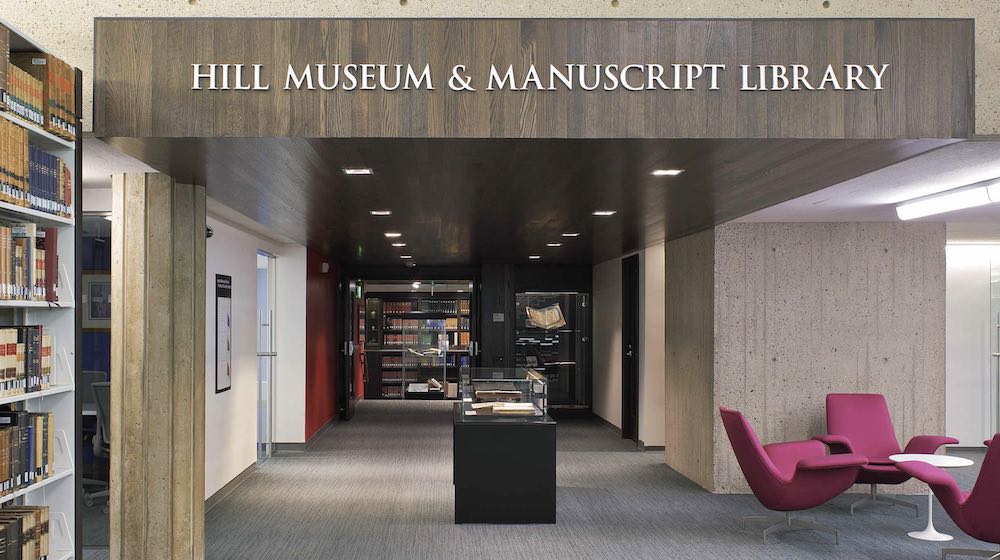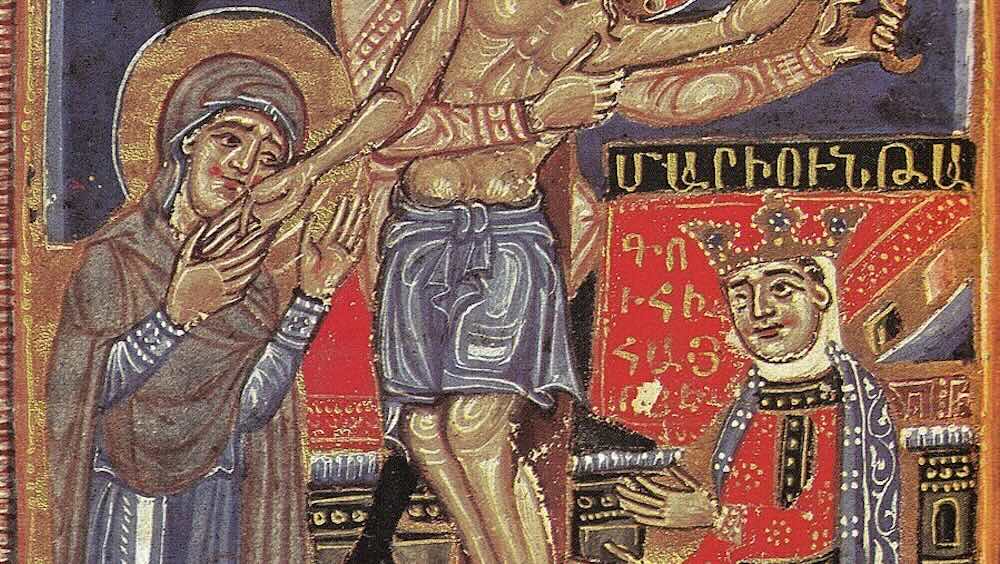A Syriac Poem On Wine
A Syriac Poem on Wine
February 3, 2022This story is part of an ongoing series of editorials in which HMML curators and catalogers examine how specific themes appear across HMML’s digital collections. From the Eastern Christian collection, Dr. James Walters shares a story about Food.
In vino veritas (In wine there is truth)
—Pliny the Elder, Natural History, 14.28
Supientiam vino obumbrari (Wisdom is obscured by wine)
—Pliny the Elder, Natural History, 23.23
Who doesn’t love a good glass of wine? White, red, or something in between, authors throughout history have praised the virtues of wine, while others have pointed out its vices. Indeed, the juxtaposition of the two sayings above, which are quoted by Pliny the Elder as common proverbs, summarizes popular attitudes toward wine in many cultures.
In medieval Christian poetry written in Syriac, wine poems in HMML’s collections generally fit within the genre of Syriac poetry known as sogīthā (plural: sogyāthā), which designates a particular structure and rhythm (usually paired couplets of 7 + 7 syllables). Some of these poems are presented as “dialog” or “dispute” poems, which feature different characters in conversation. Some are acrostic, with each stanza beginning with a successive letter of the Syriac alphabet.
While it is not always clear what context these poems were read in, at least some of them were incorporated into regular liturgies, especially in the East Syriac tradition. For example, see the manuscript DCA 00013, which includes a collection of liturgical poems collected under the title “Sogyātha which are recited on Sundays, Feast Days, and Memorials for the Whole Year.”
Wine Poems Are Best When Shared
There are multiple Syriac texts in HMML’s collections that might be called “wine poems,” but here we will focus on a single poem that appears in slightly different formats in manuscripts from both the West Syriac (Syriac Orthodox Church/Syriac Catholic Church) and East Syriac (Assyrian Church of the East/Chaldean Catholic Church) traditions.
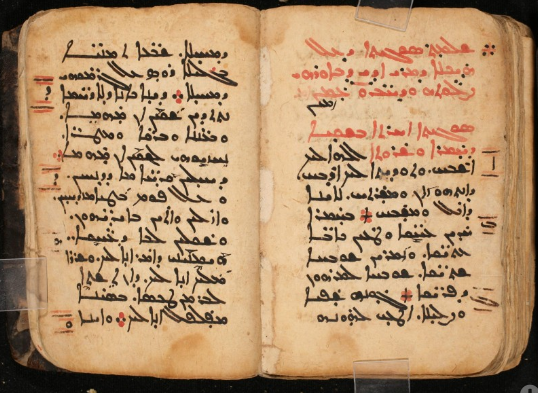
One version of the poem is found in DIYR 00202 (beginning on fol. 137v), a 15th-century West Syriac manuscript in Diyarbakir, Turkey, and in SMMJ 00138 (beginning on fol. 109r), a 19th-century West Syriac manuscript in Jerusalem. The poem is presented anonymously in both manuscripts, and it is an acrostic. A comparison of the opening lines of the poem in these two manuscripts shows evidence of small editorial changes (underlined) over time, though most of the text remains unchanged:
| DIYR 00202 (15th century) | SMMJ 00138 (19th century) |
| ܐܠܗܐ ܠܟ ܐܫܒܚ ܘܬܘܕܝܬܐ ܠܟ ܐܕܒܚ ܕܐܝܬ ܗܘ ܙܐܠ ܘܡܫܪܬܚ ܠܐܝܢܐ ܕܐܟܠ ܘܡܫܒܚ ܒܚܡܪܐ ܚܕܝܢ ܥܝܝ̈ܩܐ ܘܛܥܝܢ ܟ̈ܐܒܐ ܥܬܝܩ̈ܐ ܘܙܡܪܝܢ ܫܘܒܚܐ ܫ̈ܬܝܩܐ ܫܘܒܚܐ ܠܡܪܗܘܢ ܕܦܪܝܩ̈ܐ |
ܐܠܗܐ ܠܟ ܐܫܒܚ ܘܬܘܕܝܬܐ ܠܟ ܐܕܒܚ ܕܐܝܬ ܗܘ ܝܗܒ ܘܡܫܪܬܐܚ ܠܐܝܢܐ ܕܐܟܠ ܘܡܫܒܚ ܒܚܡܪܐ ܚܕܝܢ ܥܝܝ̈ܩܐ ܘܛܪܕ ܟ̈ܐܒܐ ܥܬܝܩ̈ܐ ܘܙܡܪܝܢ ܫܘܒܚܐ ܫ̈ܬܝܩܐ ܫܘܒܚܐ ܠܡܪܗܘܢ ܕܦܪܝܩ̈ܐ |
| I praise you, God, and I offer thanks to you as a sacrifice, for it is you who provides and makes abundance for anyone who eats and praises. With wine, the distressed rejoice, the old endure pains, and the silent sing praises, praise to the Lord of the redeemed. |
I praise you, God, and I offer thanks to you as a sacrifice, for it is you who gives and makes abundance for anyone who eats and praises. With wine, the distressed rejoice, the old drive away pains, and the silent sing praises, praise to the Lord of the redeemed. |
Despite slight changes in precise wording (and other similar changes throughout the rest of the poem), it is obvious that these two manuscripts bear witness to (more or less) the same version of the poem.
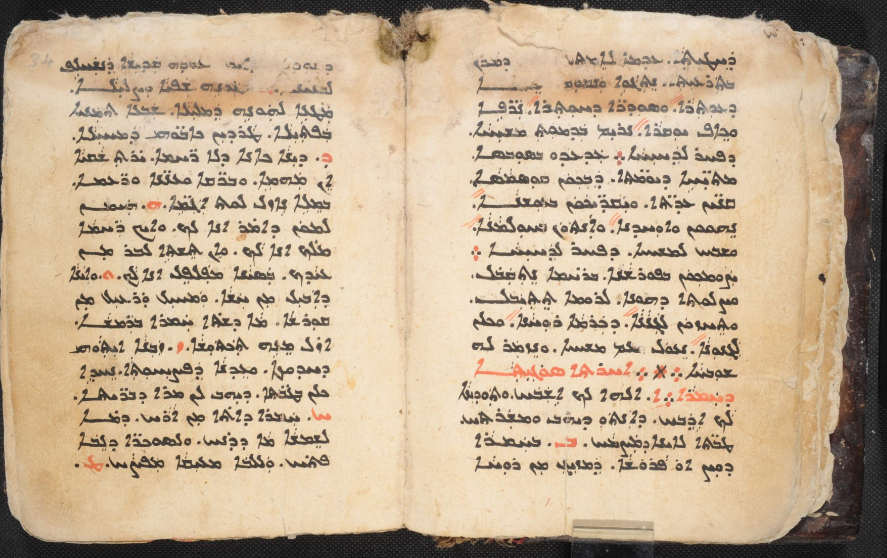
The same cannot be said, however, for a third witness to this text, which appears in at least two East Syriac manuscripts: CCM 00429 (beginning on fol. 33v), a 16th-century manuscript in Mardin, Turkey, and APSTCH THRI 00025 (beginning on fol. 79r), a 19th-century manuscript in Trichur, India. While the West Syriac version is presented anonymously, this East Syriac version appears in collections of sogyāthā generally attributed to the 14th-century author Khamis bar Qardaḥe. In fact, some manuscripts (like APSTCH THRI 00025) contain an entire collection of “sogyāthā on wine” attributed to Khamis, though not every poem in the collection is actually about wine.
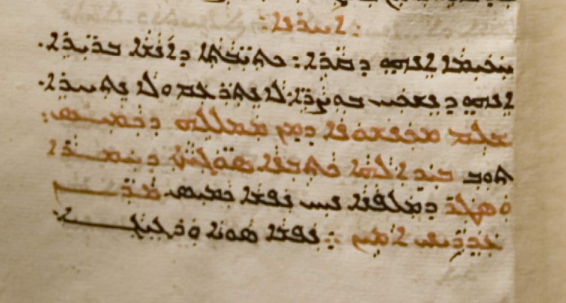
In the version attributed to Khamis, the first three lines have virtually the same wording as the West Syriac poem, but the text that follows is distinct, as seen (underlined) in this excerpt from CCM 00429 (16th century) and APSTCH THRI 00025 (19th century):
ܐܠܗܐ ܠܟ ܐܫܒܚ
ܘܬܘܕܝܬܐ ܠܟ ܐܕܒܚ
ܕܐܢܬܘ ܕܝܗܒ ܘܡܫܪܬܚ
ܛܒ̈ܬܐ ܠܐܝܢܐ ܕܡܨܡܚ
ܒܚܡܪܐ ܕܘܨ ܐܘ ܦܪܘܫܐ
ܕܡܙܝܓ ܡܢ ܪܘܚܐ ܕܩܘܕܫܐ
ܕܐܝܟܢ ܥܒܕܗ ܩܕܝܫܐ
ܕܢܫܚܠܦ ܠܒܢ̈ܝܢܫܐ
I praise you, God,
and I offer thanks to you as a sacrifice,
for it is you who gives and makes abundant
good things for anyone who shines.
Exult in wine, o discerning one,
for it was mixed by the Holy Spirit
in such a way that [the Spirit] makes it holy
so that humans might be transformed.
The rest of the poem shares wording with the West Syriac version, but also departs from it significantly. It is difficult to ascertain which version of the poem is the “original,” though it is worth noting that Khamis is known to have taken other poems from the West Syriac tradition and adapted them, as is the case with the poem “On Perfection,” originally by Bar Hebraeus, which Khamis expanded into a new work. Given the fact that this poem circulates in both West and East Syriac manuscripts, and considering Khamis’ established habit of borrowing poetry, it is likely (though not certain!) that the West Syriac version is the original.
The uncertainty regarding the origin and transmission of this poem simply points to the need for more interest in the broader tradition of wine poems in the Syriac tradition. So, pour yourself a nice glass of wine, and start reading some Syriac poetry!
Further Reading:
Brock, Sebastian P. “Poetry.” In Gorgias Encyclopedic Dictionary of the Syriac Heritage: Electronic Edition. Edited by Sebastian P. Brock, Aaron M. Butts, George A. Kiraz and Lucas Van Rompay. Digital edition prepared by David Michelson, Ute Possekel, and Daniel L. Schwartz. Gorgias Press, 2011; online ed. Beth Mardutho, 2018.
Mengozzi, Alessandro. “Khamis bar Qardaḥe.” In Gorgias Encyclopedic Dictionary of the Syriac Heritage: Electronic Edition. Edited by Sebastian P. Brock, Aaron M. Butts, George A. Kiraz and Lucas Van Rompay. Digital edition prepared by David Michelson, Ute Possekel, and Daniel L. Schwartz. Gorgias Press, 2011; online ed. Beth Mardutho, 2018.
Taylor, D. G. K. “‘Your sweet saliva is the living wine’: Drink, desire, and devotion in the Syriac wine songs of Khāmis bar Qardāḥē.” In The Syriac Renaissance, ed. H. Teule et al. (2010), 31-52.


